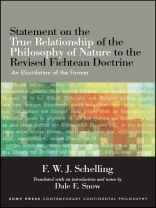Schelling’s 1806 polemic against Fichte, and his last major work on the philosophy of nature.
The heat of anger can concentrate the mind. Convinced that he had been betrayed by his former collaborator and colleague, Schelling attempts in this polemic to reach a final reckoning with Fichte. Employing the format of a book review, Schelling directs withering scorn at three of Fichte’s recent publications, at one point likening them to the hell, purgatory, and would-be paradise of Fichtean philosophy. The central bone of contention is the understanding of nature: Fichte sees it as lifeless matter in motion, sheer opposition to be overcome, while Schelling waxes poetic in his defense of a living, organic nature of which humanity is a vital part. Indeed, we do not know ourselves without understanding our connection to nature, argues Schelling, anticipating many thinkers in contemporary environmental ethics.
Dale E. Snow’s introduction sets the stage and explains the larger context of the conflict, which was already visible in the correspondence of the two philosophers, which broke off by 1802. Notes are included throughout the text, providing background information and identifying the many references to Fichte.
Inhoudsopgave
Acknowledgments
Editorial Apparatus and Standard Abbreviations
Translator’s Introduction
Translator’s Note
Statement of the True Relationship of the Philosophy of Nature to the Revised Fichtean Doctrine (Review Essay)
Statement of the True Relationship of the Philosophy of Nature to the Revised Fichtean Doctrine (Main Text)
Index
Over de auteur
Dale E. Snow is Assistant Professor of Philosophy at Loyola College.












